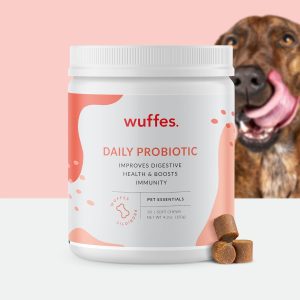
Benefits of Probiotics for Dogs
In today’s world, pet owners are increasingly turning to natural remedies and supplements to enhance the well-being of their beloved furry companions. One such supplement that has gained popularity in recent years is probiotics for dogs. These tiny microorganisms offer a multitude of benefits for your canine friend, from supporting their digestive health to boosting their overall immune system. In this article, we’ll explore the fascinating world of probiotics and delve into the numerous advantages they bring to your dog’s life.
Table of Contents
- Understanding Probiotics
- What Are Probiotics?
- How Do Probiotics Work?
- The Gut-Health Connection
- Importance of Gut Health
- How Probiotics Benefit Digestion
- Boosting Immunity
- Probiotics and the Immune System
- Reducing the Risk of Infections
- Managing Allergies
- Probiotics and Allergic Reactions
- Easing Skin Irritations
- Improving Nutrient Absorption
- Enhancing Nutrient Uptake
- Promoting Healthy Growth
- Managing Diarrhea and Constipation
- Probiotics for Gastrointestinal Balance
- Alleviating Digestive Discomfort
- Supporting Dental Health
- The Link Between Oral and Gut Health
- Fighting Bad Breath
- Reducing Stress and Anxiety
- Probiotics and Mental Well-being
- A Calmer, Happier Dog
- Choosing the Right Probiotic
- Factors to Consider
- Consulting Your Veterinarian
- Probiotics Dosage and Administration
- How Much to Give
- Different Forms of Probiotics
- Potential Side Effects
- Rare Adverse Reactions
- Monitoring Your Dog
- When to Start Probiotics
- Puppies and Adults
- Senior Dogs
- Real-Life Success Stories
- Testimonials from Pet Owners
- Transformations with Probiotics
- Common Myths Debunked
- Separating Fact from Fiction
- Probiotics Misconceptions
- Conclusion
- The Power of Probiotics
- A Healthier, Happier Dog
Understanding Probiotics
What Are Probiotics?
Probiotics are living microorganisms, often referred to as “good bacteria,” that provide numerous health benefits when consumed in adequate quantities. These beneficial bacteria naturally inhabit the gastrointestinal tract of both humans and animals, including dogs. They play a crucial role in maintaining a balanced and healthy digestive system.
How Do Probiotics Work?
Probiotics work by colonizing the gut with beneficial bacteria, which can help restore the microbial balance disrupted by factors such as illness, stress, or dietary changes. They compete with harmful bacteria for resources and create an environment where the good bacteria thrive, promoting a harmonious gut ecosystem.
The Gut-Health Connection
Importance of Gut Health
A healthy gut is vital for your dog’s overall well-being. The digestive system is not only responsible for processing food but also plays a significant role in the immune system’s function. When the gut is in balance, it can effectively absorb nutrients, fight off infections, and reduce the risk of various health issues.
How Probiotics Benefit Digestion
Probiotics enhance digestion by breaking down food more efficiently and aiding in nutrient absorption. They can also alleviate common digestive problems, such as diarrhea and constipation, by regulating bowel movements and maintaining gut health.
Boosting Immunity
Probiotics and the Immune System
The gut is home to a large portion of the immune system, and probiotics contribute to its proper functioning. By maintaining a healthy gut microbiome, probiotics help bolster the immune system’s ability to defend against infections and diseases.
Reducing the Risk of Infections
Dogs that receive regular probiotics are less susceptible to bacterial and viral infections. These beneficial bacteria create a barrier against harmful pathogens, reducing the chances of your dog falling ill.
Managing Allergies
Probiotics and Allergic Reactions
Allergies in dogs can manifest as skin irritations, itching, and gastrointestinal problems. Probiotics have been shown to mitigate these symptoms by modulating the immune response and reducing the severity of allergic reactions.
Easing Skin Irritations
Probiotics can promote healthier skin by alleviating itching and redness, making your dog more comfortable and less prone to scratching and skin infections.
Improving Nutrient Absorption
Enhancing Nutrient Uptake
Probiotics improve the absorption of essential nutrients, ensuring that your dog receives maximum benefit from their diet. This can be especially beneficial for puppies and dogs with specific dietary requirements.
Promoting Healthy Growth
In growing puppies, adequate nutrient absorption is critical for proper development. Probiotics can contribute to healthy bone and muscle growth.
Managing Diarrhea and Constipation
Probiotics for Gastrointestinal Balance
Dogs suffering from diarrhea or constipation can find relief through probiotics. These beneficial bacteria help regulate bowel movements and reduce the duration and severity of gastrointestinal issues.
Alleviating Digestive Discomfort
Probiotics can soothe digestive discomfort, making mealtime a more pleasant experience for your dog. This is particularly beneficial for dogs with sensitive stomachs.
Wuffes Digestive Probiotics for Dogs – Probiotic Chews for Dogs for Itching – Dog Health Pet Supplies – Dog Vitamins and Supplements – 30 Probiotic Dog Chews & Digestive Enzymes for Itchy Skin & Gut
Supporting Dental Health
The Link Between Oral and Gut Health
Surprisingly, there is a connection between oral and gut health. Probiotics can help maintain a healthy balance of bacteria in your dog’s mouth, reducing the risk of dental issues.
Fighting Bad Breath
Probiotics can contribute to fresher breath by reducing the proliferation of odor-causing bacteria in your dog’s mouth.
Reducing Stress and Anxiety
Probiotics and Mental Well-being
Gut health has been linked to mood and behavior in both humans and dogs. Probiotics can help reduce stress and anxiety by promoting a healthy gut-brain connection.
A Calmer, Happier Dog
Dogs receiving probiotics may exhibit less anxiety during stressful situations, such as thunderstorms or visits to the veterinarian, leading to a happier and more relaxed pet.
Choosing the Right Probiotic
Factors to Consider
Selecting the right probiotic for your dog involves considering factors such as strain specificity, potency, and the presence of additional beneficial ingredients.
Consulting Your Veterinarian
Before starting any probiotic regimen, it’s essential to consult your veterinarian to ensure it’s appropriate for your dog’s specific needs and health status.
Probiotics Dosage and Administration
How Much to Give
The dosage of probiotics varies depending on the product and your dog’s size and condition. Following the manufacturer’s recommendations is essential.
Different Forms of Probiotics
Probiotics come in various forms, including powders, capsules, and chews. Choose the form that works best for your dog’s preferences and needs.
Potential Side Effects
Rare Adverse Reactions
While probiotics are generally safe, some dogs may experience mild digestive upset when first introduced to them. Monitoring your dog’s response is crucial.
Monitoring Your Dog
Keep an eye on your dog’s overall health and well-being when introducing probiotics, and consult your veterinarian if you notice any adverse effects.

